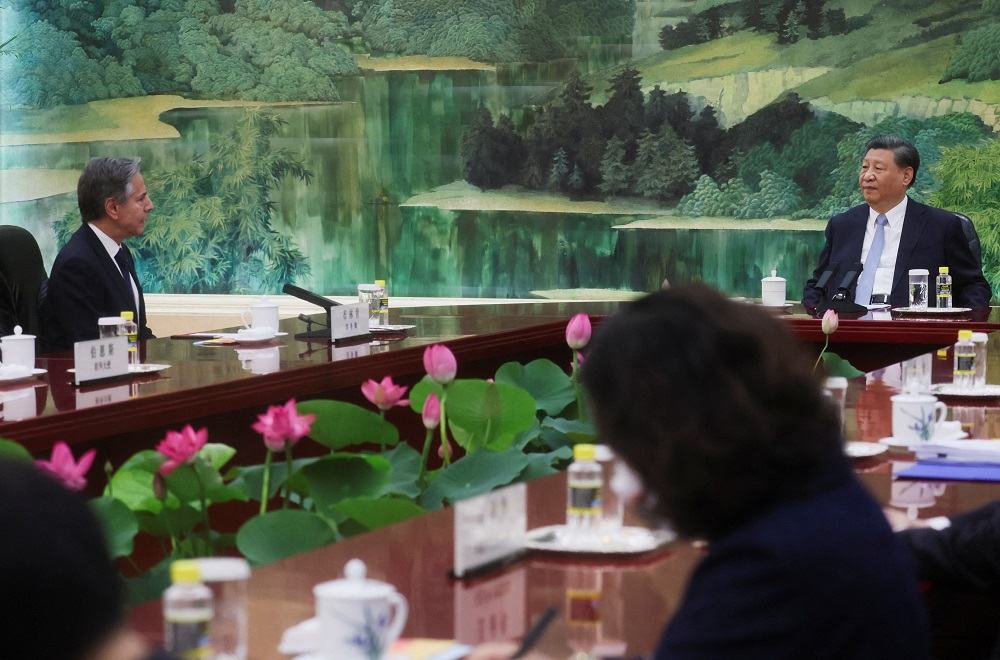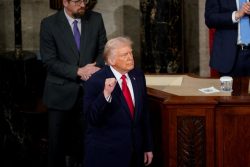
U.S. Secretary of State Antony Blinken meets with Chinese President Xi Jinping in the Great Hall of the People in Beijing on Monday.
18:15 JST, June 19, 2023
BEIJING (Reuters) — U.S. Secretary of State Antony Blinken met with Chinese President Xi Jinping on Monday, wrapping up a rare and pivotal trip to Beijing that aimed at ensuring the many disputes between the superpowers do not spiral into conflict.
Becoming the first U.S. secretary of state to meet the Chinese leader since 2018, Blinken strode towards Xi with his hand outstretched as the Chinese President stood to greet him at the Great Hall of the People.
The two delegations later faced each other across a long conference table bedecked with pink lotus flowers, with Xi at the head and Blinken just to his right. The meeting, on the final day of Blinken’s two-day visit, could help to facilitate a summit between Xi and U.S. President Joe Biden later in the year.
“The two sides have had candid and in-depth discussions,” Xi said at the start of the meeting in comments broadcast on Chinese state television.
“I hope that through this visit, Mr. Secretary, you will make more positive contributions to stabilizing China-U.S. relations,” Xi added, addressing Blinken.
Earlier, Blinken held extensive discussions with China’s top diplomat Wang Yi on Monday, and foreign minister Qin Gang on Sunday.
The talks, held at the Diaoyutai state guest house in Beijing, did not appear to make much progress in bridging the two sides’ differences on issues ranging from Taiwan to trade, human rights, stemming the flow of synthetic opioid fentanyl or their approach to the war in Ukraine.
Blinken underscored the importance of open communication channels to manage their competition during more than three hours of talks with Wang, which the State Department called “productive.”
Describing the U.S.-China relationship as being at a low point, Wang said the root cause was the United States’ wrong perception of China.
“We must take a responsible attitude toward the people, history and the world, and reverse the downward spiral of U.S.-China relations,” Wang said during the meeting with Blinken, according to a statement released by China’s foreign ministry.
Wang urged the United States to stop speculating on threats from China, abandon its “suppression” of China’s scientific and technological development, and refrain from interfering in its internal affairs, according to Chinese state media.
The lack of regular and open communication channels between the world’s top two economies has sent jitters around the world, and Beijing’s reluctance to engage in regular military-to-military talks with Washington has alarmed China’s neighbours.
During 7-1/2 hours of talks with Qin on Sunday, Blinken stressed “the need to reduce the risk of misperception and miscalculation”, the State Department said.
Both sides emphasized the importance of making it easier for their citizens to visit, and agreed on working to increase passenger flights, which boosted Chinese airline shares.
They also expressed a desire to stabilise bilateral ties despite what one U.S. official called their “profound” differences, and agreed that Qin would visit Washington to continue the conversation, though no date was announced.
“This is going to be a process of sustained diplomacy,” one senior State Department official, speaking on the condition of anonymity, said on Sunday.
Blinken’s trip, which was postponed in February after a suspected Chinese spy balloon flew over U.S. airspace, is closely followed worldwide as further deterioration of ties between the world’s two largest economies could have global implications on financial markets, trade practices and routes and supply chains.
Beijing’s tone on Taiwan, the democratic island Beijing claims as it own, has been particularly pointed throughout Blinken’s visit. Wang said “China has no room for compromise or concessions”, according to the Chinese readout.
The United States has long stuck to a policy of “strategic ambiguity” over whether it would respond militarily to an attack on Taiwan, which Beijing has refused to rule out.
When asked last year, U.S. President Joe Biden said Washington would defend Taiwan in the event of a Chinese invasion, though aides later said his comments did not reflect a policy departure from the long-standing “one China” policy.
U.S. officials have underscored that the United States does not support Taiwan independence.
The Chinese readout of Sunday’s meetings described them as constructive but made clear that Taiwan is the most important issue, and a potentially dangerous one.
“Qin Gang pointed out that the Taiwan issue is the core of China’s core interests, the most important issue in Sino-US relations, and the most prominent risk,” Chinese state media quoted Qin as having told the top U.S. diplomat.
U.S. officials have been playing down the prospect of a major breakthrough in talks, but they and analysts expect Blinken’s visit will pave the way for more bilateral meetings in coming months, including possible trips by Treasury Secretary Janet Yellen and Commerce Secretary Gina Raimondo.
Biden and Xi held long-awaited first face-to-face talks on the sidelines of a summit of the Group of 20 big economies in November on the Indonesian island of Bali, engaging in blunt talks over Taiwan and North Korea but also pledging more frequent communication, although ties since then have deteriorated.
Top Articles in News Services
-

Survey Shows False Election Info Perceived as True
-

Hong Kong Ex-Publisher Jimmy Lai’s Sentence Raises International Outcry as China Defends It
-

Japan’s Nikkei Stock Average Touches 58,000 as Yen, Jgbs Rally on Election Fallout (UPDATE 1)
-

Japan’s Nikkei Stock Average Falls as US-Iran Tensions Unsettle Investors (UPDATE 1)
-

Trump Names Former Federal Reserve Governor Warsh as the Next Fed Chair, Replacing Powell
JN ACCESS RANKING
-

Producer Behind Pop Group XG Arrested for Cocaine Possession
-

Japan PM Takaichi’s Cabinet Resigns en Masse
-

Man Infected with Measles Reportedly Dined at Restaurant in Tokyo Station
-

Israeli Ambassador to Japan Speaks about Japan’s Role in the Reconstruction of Gaza
-

Videos Plagiarized, Reposted with False Subtitles Claiming ‘Ryukyu Belongs to China’; Anti-China False Information Also Posted in Japan
























